 Petzlover
Petzlover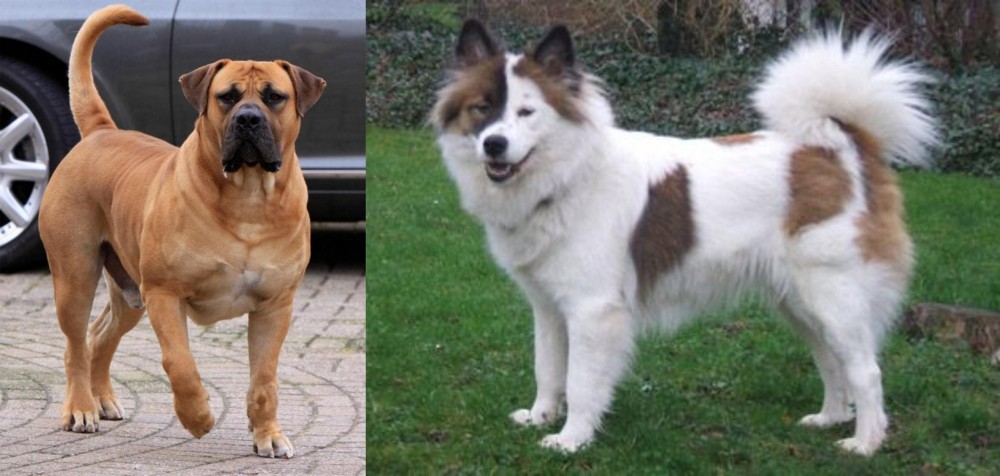 Boerboel is originated from South Africa but Elo is originated from Germany. Boerboel may grow 10 cm / 4 inches higher than Elo. Boerboel may weigh 55 kg / 122 pounds more than Elo. Boerboel may live 4 years less than Elo. Both Boerboel and Elo has same litter size. Boerboel requires Low Maintenance. But Elo requires Moderate Maintenance
Boerboel is originated from South Africa but Elo is originated from Germany. Boerboel may grow 10 cm / 4 inches higher than Elo. Boerboel may weigh 55 kg / 122 pounds more than Elo. Boerboel may live 4 years less than Elo. Both Boerboel and Elo has same litter size. Boerboel requires Low Maintenance. But Elo requires Moderate Maintenance
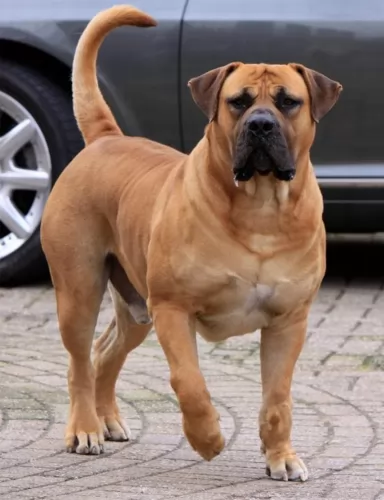 The name ‘Boerboel’ is derived from an Afrikaans/Dutch word, and the large Boerboel dog from South Africa has been specifically bred to be a farmer’s dog. Bred also to be a strong guard dog, the Boerboel is a mix of different African and European breeds, which in all likelihood, will include the Bullmastiff, the Rhodesian Ridgeback and the Bulldog. These dogs were used to hunt baboon and leopard.
The name ‘Boerboel’ is derived from an Afrikaans/Dutch word, and the large Boerboel dog from South Africa has been specifically bred to be a farmer’s dog. Bred also to be a strong guard dog, the Boerboel is a mix of different African and European breeds, which in all likelihood, will include the Bullmastiff, the Rhodesian Ridgeback and the Bulldog. These dogs were used to hunt baboon and leopard.
There is some information that suggests that the Boerboel was brought to South Africa by Jan van Riebeeck in 1652. Other information suggest that the dog is a descendant of the old Boer Hund, a powerful animal which was invaluable to the farmer.
In was in January 2010, that the American Boerboel Club was elected as the AKC’s Parent Club. The Boerboel was accepted into the Miscellaneous Class in the Working dog group.
 Developed in Germany in 1987, the Elo is a fairly new breed and there are some unique situations surrounding its development. For one thing the Elo Breeding and Research Association has trademarked the breed name, Elo. The use of the name is supervised by the Elo Breeding and Research Association. Secondly, the goal in developing the Elo is the make the best possible pet for a family. The Elo is bred for behaviors rather than appearances, for companionship rather than work.
Developed in Germany in 1987, the Elo is a fairly new breed and there are some unique situations surrounding its development. For one thing the Elo Breeding and Research Association has trademarked the breed name, Elo. The use of the name is supervised by the Elo Breeding and Research Association. Secondly, the goal in developing the Elo is the make the best possible pet for a family. The Elo is bred for behaviors rather than appearances, for companionship rather than work.
The Elo was developed when Marita and Heinz Stories crossed Old English Sheepdogs (Bobtails) with their Eurasiers. They believed that these two breeds were similar in type and development. They were looking to breed a great household pet. The litters from these original crosses were then bred again with Eurasiers or Chow, Dalmatians, and Samoyeds. This expanded the donor base and they continued to breed for character using just the Eurasier, Chow and Bobtail (Old English Sheepdog). Currently there are about 3000 dogs and 60 breeders of Elos. The breed is not really known outside of Germany but that is slowly changing.
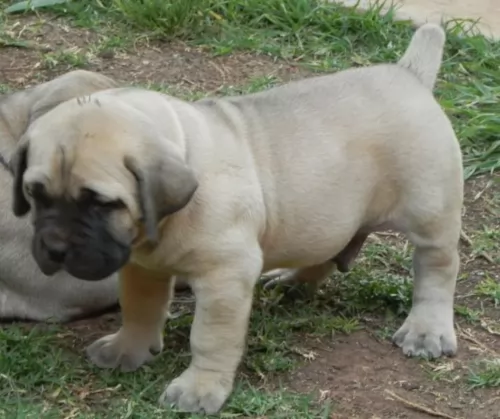 The Boerboel is a big, strong dog with powerful muscles. His height is between 61 – 66cm. He is similar looking to the Boxer dog, just heavier and bigger. The head of the dog is broad and big and the short, smooth coat can be of various shades, with breeders trying to achieve a single color of light tan and with no white. Their coats can also be red, different shades of brown and brindle.
The Boerboel is a big, strong dog with powerful muscles. His height is between 61 – 66cm. He is similar looking to the Boxer dog, just heavier and bigger. The head of the dog is broad and big and the short, smooth coat can be of various shades, with breeders trying to achieve a single color of light tan and with no white. Their coats can also be red, different shades of brown and brindle.
The dog has a black facial mask and the eyes are brown with the ears being of medium length and floppy. The Boerboel’s tail has always been docked, but today breeders are keeping the tail long. Many Boerboel lovers object to this, saying it detracts from the distinctive look of the Boerboel.
The Boerboel can be a wonderfully loyal and loving pet to their owners. They are territorial dogs and suspicious of strangers. This is a dog where it is imperative that they receive training and socialization as a puppy. They have leanings towards being aggressive so they wouldn’t be recommended to first time dog owners, unless of course the first time owners are firm and strong.
Boerboels raised the right way can be gentle giants. They often get bad publicity as regards to aggression, but this is because of they way they have been raised. Boerboels have been bred to be tough and fearless and they make excellent watchdogs. When raised and trained correctly, they make awesome, devoted companions, even around children and other pets.
 As previously mentioned the Elo is bred for behaviors not appearance and not work. Therefore, the appearance of any one dog can vary greatly. There is a breed standard but there is also a lot of diversity in the breed. The Elos’ body is longer than it is tall and it tail is full and furry. He carries his tail over his back in a curve. The Elo has furry, slightly rounded, wide set ears. The undercoat is dense, and the top coat length can be medium or short.
As previously mentioned the Elo is bred for behaviors not appearance and not work. Therefore, the appearance of any one dog can vary greatly. There is a breed standard but there is also a lot of diversity in the breed. The Elos’ body is longer than it is tall and it tail is full and furry. He carries his tail over his back in a curve. The Elo has furry, slightly rounded, wide set ears. The undercoat is dense, and the top coat length can be medium or short.
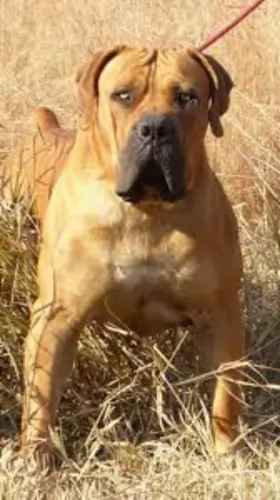 A well trained, socialized Boerboel makes a splendid pet. This is one breed known to have excellent guard- and watch dog characteristics. Boerboels are known for being protective when necessary. When not on guard, they make wonderful pets. He’ll need plenty of exercise, but he loves to also spend time indoors with his human family.
A well trained, socialized Boerboel makes a splendid pet. This is one breed known to have excellent guard- and watch dog characteristics. Boerboels are known for being protective when necessary. When not on guard, they make wonderful pets. He’ll need plenty of exercise, but he loves to also spend time indoors with his human family.
This a a bold, fearless dog who becomes devoted to his family. With the right training he is obedient and affectionate and knows how to behave appropriately indoors- and outdoors. For such a big dog, the African Boeboel’s temperament can be surprisingly gentle and affectionate around the family that he loves.
 Having been bred to be a companion animal, the Elo loves children, is loyal, playful, obedient and calm. They love to and need to be with their people. These are not independent, think on their own dogs. They depend on their people in order to be happy and well behaved. He is outgoing and friendly with people.
Having been bred to be a companion animal, the Elo loves children, is loyal, playful, obedient and calm. They love to and need to be with their people. These are not independent, think on their own dogs. They depend on their people in order to be happy and well behaved. He is outgoing and friendly with people.
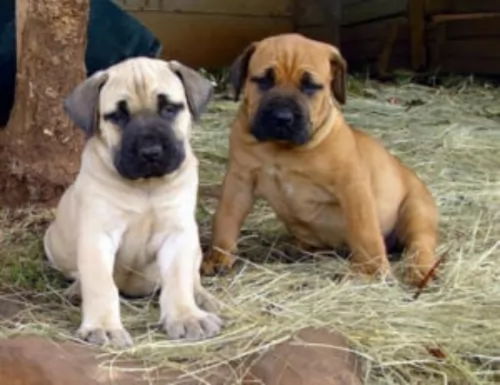 Many health problems experienced with any dog are found in the way dogs are fed, the way they are exercised and the way they are attended to when they are ill. Boerboels are healthy dogs and suffer fewer health defects than most similar breeds. The average life expectancy of a Boerboel is about 10 to 12 years. There are one or two health issues you’ll want to watch out for with your Boerboel.
Many health problems experienced with any dog are found in the way dogs are fed, the way they are exercised and the way they are attended to when they are ill. Boerboels are healthy dogs and suffer fewer health defects than most similar breeds. The average life expectancy of a Boerboel is about 10 to 12 years. There are one or two health issues you’ll want to watch out for with your Boerboel.
This aliment is typically found in large breed dogs. It’s a problem caused by a malformation of the hip joint. Over time hip dysplasia causes discomfort, pain and even arthritis and lameness. It is genetically inherited, with its severity being influenced by environmental factors. There are treatments available to alleviate the symptoms and make the dog more comfortable.
The Boerboel has plenty of muscle mass, and because he is such a large dog with a big appetite, he can lean towards obesity. Plenty of activities will be imperative to maintain muscle mass and ward off obesity. Over-eating suppresses the immune system, so over-feeding your dog simply contributes to ill health.
 At this point in time the Elo breed is very young and has a very small population, so the breeding group is small and probably inbred. This can lead to hereditary diseases and the Elo is not immune. However, they are a healthy breed and it seems the major issue is Disticha – an eye disease that causes corneal damage. It causes corneal ulcers, inflammation, scarring and tearing. There are a variety of treatments including surgery
At this point in time the Elo breed is very young and has a very small population, so the breeding group is small and probably inbred. This can lead to hereditary diseases and the Elo is not immune. However, they are a healthy breed and it seems the major issue is Disticha – an eye disease that causes corneal damage. It causes corneal ulcers, inflammation, scarring and tearing. There are a variety of treatments including surgery
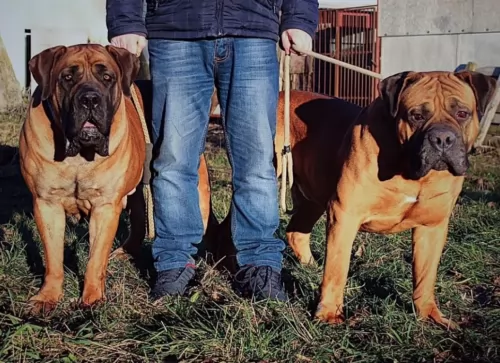 Boerboels are a robust breed and their short hair doesn’t shed heavily. Your Boerbul will require a thorough brushing twice a week to remove loose hair and to keep the coat shiny and healthy.
Boerboels are a robust breed and their short hair doesn’t shed heavily. Your Boerbul will require a thorough brushing twice a week to remove loose hair and to keep the coat shiny and healthy.
Boerboels, just like any other dog, should have their teeth brushed regularly to prevent tartar and plaque build-up. Left unattended, your pet can battle with tooth decay and gum disease.
Your Boerboel puppy will need ‘large breed puppy’ dog food. Speak to your veterinarian about wet- or dry kibble choices. An adult Boerboel will certainly need raw meat in his diet. When you do research, you find that the best Boerboel breeders are advocates for raw feeding. Home made food with rice, vegetables and meat as well as the best quality commercially manufactured dog foods for large breeds are excellent choices but raw meat is imperative as part of every dog’s diet.
 The Elo is a non-working family dog so do not over feed them. Use a high quality dry food made for a medium size dog.
The Elo is a non-working family dog so do not over feed them. Use a high quality dry food made for a medium size dog.
As mentioned previously the Elo breed is so young as a breed that there have been very few health studies and the only inherited issue at this time besides the Disticha.
Even though the Elo is a non-working dog, they do require a substantial amount of exercise daily. They need outdoors space to run and play as they are very playful with their family. He loves to go on walks, to run, play and dig. Yes, he can be a digger if he is not provided with appropriate and alternative exercise. Without exercise the Elo can be irritable and display behavior issues.